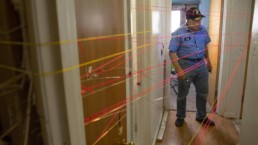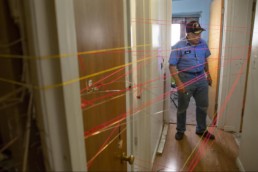Review: ‘Peace Officer’
'Peace Officer' is a relevant and challenging documentary, yet just like its protagonist in Dub Lawrence, it’s one that’s clear-eyed enough to offer solutions to the problems it addresses.
The day is September 22, 2008 – exactly 7 years ago today. A 911 phone operative receives a distress signal from a woman about her suicidal husband. What followed was a protracted standoff with an armed-to-the-teeth police force and the aforementioned man trapped in his truck with a pistol. The encounter lasts 12 hours, and ends with a yielding suspect being subject to non-lethal rounds, 6 flashbang grenades, and ultimately a fatal sniper round. The Farmington, Utah police force’s first instinct is to tell the wife that her husband had killed himself. The documented video footage of this event is presented right before the opening title of Peace Officer rolls.
One of the most immediate things to hit when watching Brad Barber and Scott Christopherson’s documentary is how impeccably researched it is. The film gives a comprehensive overview of police militarization in the United States, starting with the Watts riots here in Los Angeles up until the more recent and literal sense of the word militarization: we see outdated equipment and vehicles from prior wars “trickle down” into middle America neighborhoods, which is as unsettling to see as it sounds. We’re then shown a handful of cases within the state of Utah wherein the police used unnecessary, questionable, sometimes even trigger-happy tactics. In many of these scenarios, tactical teams inexplicably decide not to announce themselves.
‘Peace Officer’ is a relevant and challenging documentary, yet just like its protagonist in Dub Lawrence, it’s one that’s clear-eyed enough to offer solutions to the problems it addresses.
Barber and Christopherson’s main subject is William J. “Dub” Lawrence, a man who holds the record for youngest sheriff in the Davis County of Utah. Beyond this statistic is a seasoned public servant with a unique perspective to the trends in law enforcement power. Lawrence initiated the first active SWAT team in his jurisdiction, but has since bore witness to the extreme tactics that led to that fateful September 22 day when his son-in law happened to be the victim.
It’s hard to imagine a better guide through the concerns of police militarization than Lawrence. Whether he’s re-examining crime scenes to debunk hackneyed police investigation work, campaigning for change in Salt Lake City, or at his own headquarters “self-medicating with work”, he’s an endearing figure because he has goals. He hopes for a day where the modern police unit can return to the status of a “qualified, trained, peace officer” that he remembers when he first took office. Despite whatever personal suffering Lawrence has incurred, he is a man of clear conscience and empathy.
Peace Officer features subjects who can frame their arguments in an intelligent manner. And it’s not just Lawrence; the journalists and scholars interviewed, for example, strip the subject of police brutality to its core – none of them have much time to confront the controversial comorbid factors such as racial discrimination. The most poignant point made here is that the violence is often avoidable, but it ultimately comes down to millisecond reactions on both sides.
The film is also heartbreaking when we see the confused enmity of interviewed police officers, whose grief and guilt are often visible when discussing policemen who have fallen to friendly fire. The same can be said when we see the families of victims are interviewed – these are people who have become so disillusioned with law enforcement that they firmly belief officers don’t know “what they’re protecting the people from” anymore. Peace Officer is a relevant and challenging documentary, yet just like its protagonist in Dub Lawrence, it’s one that’s clear-eyed enough to offer solutions to the problems it addresses.
Peace Officer is now playing at the Nuart Theater in Los Angeles.
Jared Anderson
Jared was always a bit of a math nerd in school, but a fan of film critic personas like Roger Ebert and Mark Kermode. He currently resides in College Station, TX and has started Graduate School at Texas A&M (M.S. Statistics) while continuing to write on films that expand to nearby theaters.


